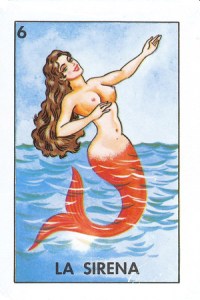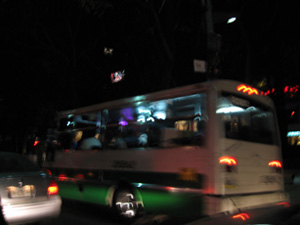
When teaching Spanish, I always learn something new from my students, or rather mis estudiantes. Sometimes I don’t notice things that are part of our Mexican culture because they are just part of everyday life. For example, we don’t always notice daylight because it’s always there (in the daytime, of course) and we just take it for granted. In my Spanish classes, I just happen to take Spanish for granted. In fact, I’m rarely aware of which language I’m speaking. So, when I’m supposed to be speaking English, I’m speaking Spanish, and vice versa.
So, today, we had a little bit of free class time, so I decided to show a movie that was filmed in Spanish. Students just love watching movies in class. Rather than conversing in Spanish or doing more exercises. Well, I like to show movies in Spanish because this way they can learn something about Hispanic culture that they can’t learn from a textbook. A student had mentioned the Mexican movie Y tú mamá también earlier in the semester. In the culture section of our textbook Sueña, Gael García Bernal is profiled and specifically mentions Y tú mamá también in his film credits. I thought this would be a good movie to teach students a little about Mexican culture and Mexican expressions, otherwise known as mexicanismos. Afterwards, the student who had originally mentioned the movie told me she thought the movie was a little racy. I must admit that it is. I saw it at the show when it first came out. I was in a theater full of Mexicans at the Ford City Theaters, and they were all shouting “¡Huy!” at some of the scenes at the end of the movie.
It seems that no matter what movie I show in class, a few students always comment about something in the movie that was offensive to them. All good movies will offend at least some of my students. Most of the other students love seeing the movie regardless of the content, whether deemed offensive or not. I’ve shown movies from México, Spain, Guatemala, Argentina, and the U.S. (in Spanish). They always address some controversial topic such as sex, incest, murder, etc. and they usually have a tragic, depressing ending. But they are always good movies. The advantage of showing these movies is that I know none of my students saw them in their high school Spanish class. No sane high school teacher would dare show such risqué films without taking a chance of getting disciplined and/or fired. I teach at a university, so I have a little more liberty in film selection since all my students are older than eighteen.
Sometimes when students tell me they find a movie offensive because of too much violence or sex, I tell them that they may leave the class without penalty if they find the movie objectionable. No one ever leaves. In fact, they find the movie enthralling. So I just don’t understand why they complained in the first place. Perhaps, to clear their conscience. Besides, everyone loves Penelope Cruz movies, and she hasn’t made a movie without any offensive topics. My favorite movie with her is the one where she plays a pregnant nun with AIDS.
On a couple of occasions, I offended some students unintentionally by playing Lotería. This is a board game like Bingo that I have been playing since I was a little boy. Every student gets a board with pictures of people and things such as La dama, El soldado, La rana, etc. There is a deck of cards with these same pictures. So, I shuffle the cards and call out the names. If your board has the picture that I called out, you mark the picture with an uncooked pinto bean (provided by me, since students don’t happen to walk around carrying pinto beans with them, but I do). When you cover all the pictures with pinto beans, YOU WIN! And you shout ¡Lotería! at the top of your lungs and I give you a little prize like a packet of chiclets or something else that’s Mexican. This is a child’s game that you would think would not offend anyone. Well, if you thought that, you would be wrong!
Once, actually, this happened several times, when I called, La sirena, a female student shrieked and said that the mermaid had exposed breasts. She was genuinely offended by the nudity. I didn’t know what to say. So, I looked at the card of La sirena and sure enough she had exposed breasts! I’ve been playing Lotería my whole life and I never even noticed her exposed breasts. To me she was just a mermaid. A cartoon mermaid. All I ever saw was her long hair and her fish tail. I mean, if I saw a real mermaid in person, I wouldn’t be caught staring at her breasts!
Why didn’t I see La sirena‘s breasts before? I’m not sure. Probably because I always saw my mother breast-feeding my younger brothers. And in public, too! I remember my mother taking my brothers and me to the park to play in the playground and she would breast-feed my baby brother right there on the park bench. And she wasn’t alone, either! There were always at least two or three other mothers breast-feeding, too. Maybe I just view breasts differently from everyone else. Breasts were just part of my Mexican culture while growing up and I just never noticed them on La sirena or in movies until students point them out to me! ¡Ay! ¡Ay! ¡Ay!


